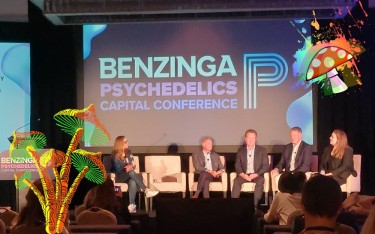
How do people make any money or revenue with psychedlics? Legally speaking, how is anyone starting a business with shrooms and LSD? You may remember that Cannabis.net asked the same question at the Benzinga Psychedlics show in Miami this past year!
The answer then is the same as now, ketamine clinics set up around VA hospitals was the very first legal honey pot for the psychedelics industry. Once veterans health insurance approved the payments, it was a race with VC funds to set up as many ketamine clinics as possible around large areas of veterans or bigger VA hospitals.
Now, the first ketamine-assisted psychotherapy clinic in Ottawa, Canada, has opened its doors, offering patients a fresh therapeutic avenue for managing treatment-resistant depression, anxiety, and addiction. The Canadian Centre for Psychedelic Healing, located on Sparks Street, extends access to oral ketamine administration alongside therapeutic support for individuals and their families to address mental health conditions.
According to Dr. Neel Chadha, the clinic’s medical director, ketamine possesses unique properties that make it particularly effective in healing and treating resistant mental health disorders. Dr. Chadha explained during an interview on Newstalk 580 CFRA’s CFRA Live with Andrew Pinsent that ketamine primarily influences a neurotransmitter known as glutamate, a chemical messenger in the brain, resulting in an overall mood improvement for individuals.
Chadha explains that ketamine can uniquely disconnect individuals from their sense of identity and ego, facilitating an altered state that fosters new perspectives on various aspects of life. Furthermore, it enables the adjustment of default thought patterns, precious in the context of mental health, where negative thought patterns often prevail. Lastly, ketamine enhances the brain’s capacity to establish new connections through processes known as neurogenesis and neuroplasticity.
According to Health Canada, ketamine is a swift-acting anesthetic employed in medical and veterinary settings. It is categorized as a dissociative drug, inducing a feeling of detachment between the mind and the body, effectively separating them. Its mechanism of action involves interrupting the brain’s reception of nerve signals related to pain and altering the perception of visual and auditory stimuli, as described on Health Canada’s website.
The clinic primarily focuses on individuals who have explored various medications and therapy modalities but have not achieved satisfactory relief from their symptoms. This includes individuals coping with mental health conditions or chronic pain disorders who have not experienced desired outcomes from conventional therapies. The clinic’s scope extends to first responders such as paramedics and police officers, as well as individuals like teachers who have been unable to work due to mental health issues.
Chadha emphasizes that this treatment represents a groundbreaking advancement for patients. He stated, “The data demonstrates that approximately 70% of patients commencing ketamine-assisted psychotherapy experience improvement. Internally, within our clinic, we’ve witnessed a remarkable 93% success rate,” as reported to CTV News Ottawa.
The clinic addresses various conditions, such as treatment-resistant depression, anxiety, PTSD, chronic pain, addiction, and eating disorders. In addition to these services, the privately-run Canadian Centre for Psychedelic Healing also provides low-dose ketamine treatments for pain management and psychotherapy.
In May, the Royal Ottawa introduced the BMO Innovative Clinic for Depression, designed to cater to individuals with challenging-to-treat depression. The Royal asserts that the clinic aims to leverage the potential of esketamine to transform treatment options for those living with difficult-to-treat depression. Esketamine is derived from ketamine and gained approval from Health Canada in 2020.
The Canadian Centre for Psychedelic Healing also operates additional locations in Thunder Bay and Sault Ste. Marie.
Not Peculiar to Canada
Presently, the United States is experiencing a notable upswing in the popularity of ketamine. This substance, recognized for its rapid-acting antidepressant characteristics and mildly psychedelic effects, continues to be used recreationally by individuals frequenting clubs and by students. However, over the past decade, thousands of patients have legally received therapy involving ketamine, and hundreds of ketamine clinics have emerged in major cities. Manhattan alone boasts 12 such clinics.
Nevertheless, this burgeoning industry is encountering challenges like the broader emerging psychedelic industry. One of the leading chains of startup clinics offering ketamine treatments has recently faced financial difficulties. Another is in a precarious situation, and others are grappling with uncertainty. The question arises: why are so many ketamine clinics facing struggles despite a growing demand?
The prevailing belief is that the industry expanded too rapidly. Multiple clinic groups competed to claim a portion of the projected $3 billion revenue the industry is set to generate between the current year and 2029. Yet, with millions of dollars infused by private equity, investors are increasingly impatient with specific clinics.
Closure of Ketamine Clinics in the US
Benjamin Ramm, the author of the upcoming book “High Definition: A Vision for our Psychedelic Future,” voiced his perspective on the situation by stating that the psychedelic bubble was hugely inflated. He highlighted the unsustainable rapid expansion plans of Field Trip Health, which aimed to establish 75 centers across the US by 2024. This expansion frenzy illustrates the limitations of startup enthusiasm as we transition from the peak of exaggerated expectations to the trough of disillusionment.
Another instance is Actify Neurotherapies, backed by private equity, which abruptly shuttered all twelve clinics in 2020, vanishing almost overnight. Analysts suggest that as many as seven out of ten psychedelic companies face significant challenges due to a banking crisis, resulting in a scarcity of capital. Some have even forewarned of an impending “bloodbath.”
The landscape is described by Lauren Taus, a ketamine-assisted psychotherapist with a private practice, as “a wild, wild west.” She notes that there has been a frantic rush to commercialize the field, led by entrepreneurs who saw a lucrative opportunity but often needed a complete understanding of the necessary elements for success.
Factors contributing to these closures include premature expansion, delays in health insurance coverage payments, and investors’ waning patience. Additionally, experts point to the rapid rise of telehealth startups, which can swiftly provide low-cost ketamine prescriptions to people’s homes without requiring an in-person assessment.
Conclusion
The turbulent developments in the unregulated ketamine industry could offer a cautionary lesson for proponents of the legalization of medicinal drugs like MDMA and psilocybin mushrooms, both expected to receive regulatory approval for medical use in the coming years. There is concern that the emergence of a profit-driven clinical culture, often called “corporadelic,” may undermine the aspirations for an era of psychedelic healing.
Steven Spielberg, a critic of the current state of the ketamine industry, remarks, “While ketamine proves highly effective for many patients, the ketamine industry itself falls short.” He predicts a continuous influx of ketamine clinics as opportunists seek quick gains. However, he also anticipates that when macroeconomic conditions shift, the industry will witness consolidation, ill-advised expansion, and eventual bankruptcies when the conditions revert.
MORE ON KETAMINE CLINICS AS A BUSINESS, READ ON…
BENZINGA PSYCHEDELICS SHOW? WHAT DID WE LEARN ABOUT MONEY?
- SEO Powered Content & PR Distribution. Get Amplified Today.
- PlatoData.Network Vertical Generative Ai. Empower Yourself. Access Here.
- PlatoAiStream. Web3 Intelligence. Knowledge Amplified. Access Here.
- PlatoESG. Carbon, CleanTech, Energy, Environment, Solar, Waste Management. Access Here.
- PlatoHealth. Biotech and Clinical Trials Intelligence. Access Here.
- Source: http://cannabis.net/blog/medical/how-do-make-money-money-in-psychedelics-ketamine-clinics-hope-to-help-patients-with-severe-depr




